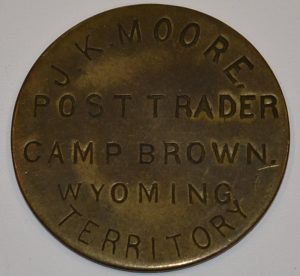Part of a recent gift to the Fremont County Pioneer Museum is a set of Post Trader trade tokens from the J.K. Moore store. The full gift will be on exhibit at the museum in the summer of 2020 with select pieces being added to the J.K. Moore store permanent exhibit in the fall.
Post Traders – Trade Tokens
By the late 1850s in Wyoming trade tokens were being produced and used as a replacement for payment in American dollars to local Native Americans. They were developed for commerce and payroll.
One purpose of the tokens was to place a firm value on a barter or trade between the store and a Native American wishing to purchase basic living supplies and European goods. Native Americans were able to sell their wares, such as hides, pelts or beaded goods such as moccasins or bags, to a trading post and be paid in trade tokens and, then in turn purchase goods and supplies from that post using their tokens. Another use was for tokens was as payment for services rendered such as hauling freight and handy work around the shop.
The tokens were referred to as brass checks by the Camp Brown and Fort Washakie store clerks. Native American’s referred to them as yellow money or Oha-boo-u-way to the Shoshone and Ne-ha-yahbich-thay to the Arapahoe speakers.
Prior to 1870 there were no post traders. Individuals filling essentially the same role were called sutlers, which means a non-military shopkeeper or supplier to an army post. In 1867 there was a congressional joint resolution that replaced sutlers with post traders and in 1870 congress established post traders.
Post traders were appointed by military authority and held their position indefinitely. The stores were created to supply domestic goods to U.S. Soldiers and their families posted at military camps around the United States as an expansion of what commissaries and base exchanges offered. They were also open to the public.
The first Lander area sutler and then post trader was Mr. J.K. Moore who was commissioned in 1869 by the U.S. military to accompany soldiers establishing Camp Brown, in what is now downtown Lander, and set up shop. Lasting less than three years in that location Camp Brown and Moore’s shop moved north in 1871 to a new military base also named Camp Brown but renamed Fort Washakie in January of 1879.
A quote dated March 26, 1878 from J.K. Moore states “It is my belief now that I will have no less than 1000 buffalo robes, and more likely 2000 for shipment” gives us idea of the size and influence Moore’s store had on the residents of the Wind River Indian Reservation and Fort Washakie. The use of trade tokens by post traders went on for about twenty-five years until 1894 when they were withdrawn from circulation.


